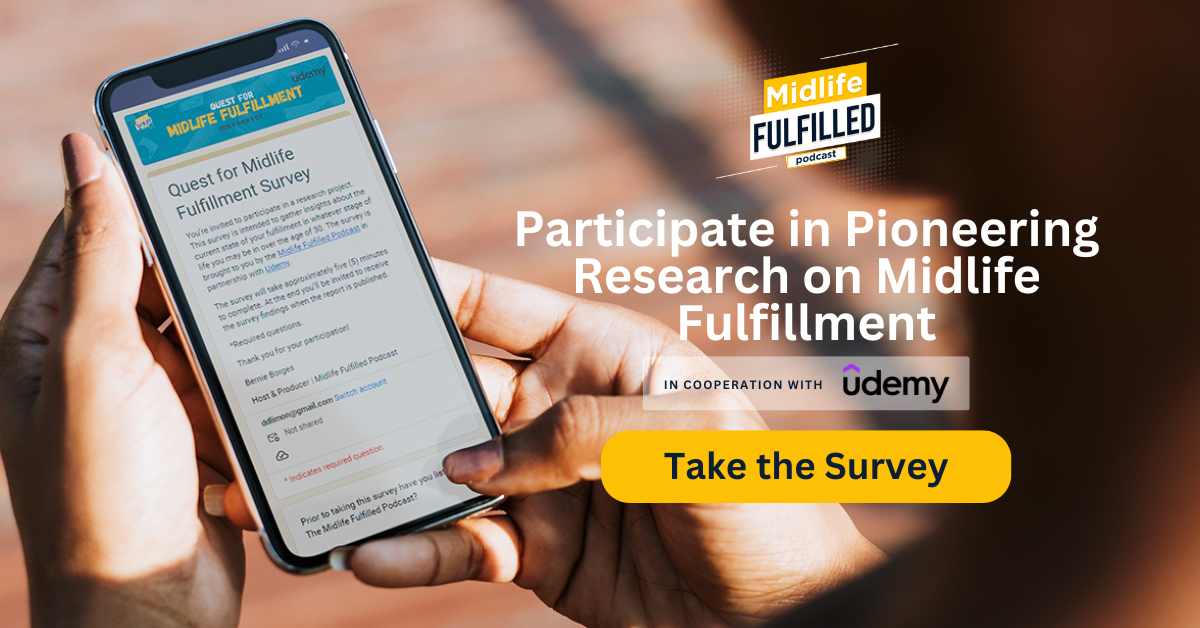Bernie Borges [00:00:00]:
Hello, my midlife friend. This is Bernie Borges, your host to the Midlife Fulfilled podcast. And this is episode 1 81, a takeaway episode from 180, my conversation with Dave Altman. On takeaway episodes, you know the drill. I summarize the key discussion points from the previous episode, and then I hone in on one key takeaway that I wanna emphasize to you, and then I issue you a challenge to consider on this topic. 1st, as always, I wanna begin by reintroducing you to Dave Altman. Dave Altman is the chief research and innovation officer at the Center For Creative Leadership. CCL was founded in 1970 and today is a leading nonprofit provider of leadership development, and is considered a pioneer in the field of global leadership research.
Bernie Borges [00:00:55]:
Dave’s credentials are very impressive. He oversees several global groups at CCL including Leadership Analytics, Leadership Research, portfolio and leadership solutions, partnerships and innovation, and future leadership and digital transformation. Wow. He stays busy. Dave’s area of expertise is recognized as leadership development, community development, evaluation research, health promotion, and disease prevention, and public health. Dave has published over 100 journal articles and book chapters, as well as 5 books of his own, including Discovering the Leader in You, which is linked up in the show notes. Now before I get to my main takeaway, I want to summarize 3 key discussion points from our conversation on episode 180 featuring Dave Altman. Number 1, leadership starts with leading oneself.
Bernie Borges [00:01:59]:
Dave emphasizes that the essence of leadership really begins with leading oneself. He says that leadership is not solely about holding a formal title or position, instead it encompasses a way of being that guides our actions and our interactions. And by recognizing and embracing the leadership roles that we play in different aspects of our lives, we can develop a positive impact on the people around us, including our communities. In fact, this broader understanding of leadership really enables individuals to develop a sense of agency and purpose that fosters a culture of leadership at all levels of society. Number 2. The role of self awareness in leadership. Dave reinforces the idea that effective leadership stems from a holistic and a balanced approach to self awareness. By integrating physical and mental well-being, along with professional growth and meaningful relationships and a focus on leaving a positive impact, individuals can enhance their leadership capacity and contribute to a more fulfilling life experience.
Bernie Borges [00:03:17]:
Yes. I’m all about a fulfilling life experience. And number 3. Embracing humanity in leadership. You know, throughout the conversation, Dave highlights the human aspect of leadership, the significance of humility, empathy, and authentic connection with those that are being led. By addressing leaders as human beings with intrinsic value and not just instruments for achieving some organizational objective. There’s a shift towards a more meaningful, fulfilling leadership paradigm. And the recognition of common values and experiences across different generations underscores the importance of embracing diversity and inclusion in leadership practices.
Bernie Borges [00:04:06]:
The willingness to learn from each other’s experiences and challenges and the acknowledgment of the human need for belonging and mattering are key drivers for creating a collaborative and impactful leadership culture. So my key takeaway from my conversation with Dave Altman is the reality that these three principles are pillars, and they truly are what defines leadership. So I wanna offer my perspective on each of these three principles, and then wrap them up in one overarching point as my main takeaway and challenge to you. Dave begins with the importance of leading oneself. In fact, on episode 180, he shared a story about 16 year old young man in Ethiopia who was going through one of CCL’s programs. And when he was asked what he learned, he said that his biggest takeaway was that for him to be an effective leader, he must first learn to lead himself. This is powerful because when you lead others, those that you lead are able to observe if you are capable of leading yourself. A leader lacks credibility if they lead with an attitude of do as I say, not as I do.
Bernie Borges [00:05:25]:
I’m sure you’ve heard that expression before. Right? What this means is that a leader must not just talk the talk, but the leader must walk the walk. And while no one expects a leader to be perfect, the truth is those who follow you expect you to be nearly perfect. What I mean is, they expect you to be a role model for whatever it is that you’re leading them to do. And again, while perfection may not be the standard to which you are judged, the standard is high. You’re expected to have your stuff together in this discipline that you’re leading in. So whether that’s your role as a parent or a coach or a mentor or a boss at work, those who follow you wanna see and know that you are trustworthy, credible, and capable, and that you are aware of this. And this leads me to my commentary on the second discussion point, the role of self awareness.
Bernie Borges [00:06:30]:
This is a big one. Dave shared on episode 180 that self awareness is foundational to leadership development. He also shared that he has never met a leader across many thousands of leaders that he’s interacted with that has quote unquote pristine and perfect self awareness. He says that there’s always a gap even among the most iconic leaders, including titans of industry or in the military or in government. Now, on one hand, we can take some comfort in knowing that even the most iconic leaders lack something in self awareness. But on the other hand, I look at this as an opportunity. Here’s what I mean. If no one has truly mastered self awareness, what if you and I focused our energy on being as self aware as we possibly could so that we can be perceived as being self aware by those that we lead.
Bernie Borges [00:07:31]:
So what does self awareness look like in a leadership role? Well, obviously, this is going to be unique to each of us. So I want to speak to this in the first person, speaking for myself. So for me, it begins with understanding who I am and who I am not. That means that I have to acknowledge the traits, the skills, and the mindsets that are part of who I am and know where they fit into my leadership role as well as where they don’t fit. So in my case, a little bit of background on me. I’m originally from New York City, born and raised. And if I’m not careful, I can have an edge to my personality that native New Yorkers wouldn’t even blink an eye about. But if you’re not from New York City, certain behaviors might be perceived as either too strong or just otherwise off putting.
Bernie Borges [00:08:24]:
And, honestly, sometimes I’m completely naive to it. So it’s something that I’m self aware about, and I have been for a long time. Another example of self awareness for me is when I listen to someone. I need to really listen by letting them finish their point before I jump in with something that I wanna say. It means that I need to ask questions in a way that invites the person to think on their own instead of me giving them the answer. In other words, my self awareness on this is to be an enabler of development in a person rather than speaking the answer right away. I need to remind myself of the old adage that people remember how you make them feel a lot more than they remember what you said. Now, this doesn’t mean that I’m always on a mission to make people feel good.
Bernie Borges [00:09:17]:
Of course, there are situations that don’t warrant feeling good as the desired outcome. I mean, I can remember when my kids were younger, many years ago, I didn’t seek to make my child feel good when they needed to be disciplined for something. But I needed to be self aware that the situation was a teaching moment for my kid. And now when I coach someone in a life coaching relationship, I ask a lot of questions to get the person talking. And often, the conversation is 10% me asking questions and listening and 90% the other person talking. And it’s amazing how often we can arrive at a point of clarification that seems to happen through natural conversation. In reality, I’m self aware that the questioning and the listening, along with comments about what I’m hearing, is what has allowed us to arrive at a point of clarification. In a work setting, my self awareness is the most vulnerable because I’m aware that I have some room for improvement, as I think most of us do.
Bernie Borges [00:10:28]:
And just as Dave shares, every leader has a disconnect between who they think they are and how their behavior is perceived by others. And this is an opportunity to get better. As long as I have my eyes wide open with a self awareness lens, I’m confident that the disconnect is not a gigantic canyon, at least I hope it’s not. Just by being consciously self aware that my leadership role has an intended outcome for the benefit of a team or the organization, this alone is valuable. This heightens my consciousness to behave in ways that I want to achieve our desired outcome. And this leads to the 3rd discussion point from our conversation, embracing humanity and leadership. Dave makes a strong point about the importance of treating people as people, not as instruments. This is about leading with humility, empathy, and authentic connection.
Bernie Borges [00:11:32]:
Let’s face it. People know when you’re authentic and when you’re not. People know when you’re humble and when you’re not. People know when you’re empathetic and when you’re not. And as I mentioned earlier, when people feel that you care, that you listen, that you want them to succeed, people respond well to this. Again, speaking for myself, I’ve always tried to lead with humility. And one way that I’ve done this in a work setting is by participating directly in an activity that we’re doing as a team. This demonstrates several things.
Bernie Borges [00:12:11]:
It shows that, number 1, I’m capable. I’m not just talking about it, but it shows that I’m willing. And it shows that I’m no more important or no more valuable than the others on the team. It demonstrates humility. I love this next example that I’m gonna share with you. Billionaire Mark Cuban, if you don’t know who he is, he is a billionaire in the United States. And when he purchased the Dallas Mavericks, which is a professional basketball team in the NBA, the National Basketball Association, he set up a sales room with salespeople to sell tickets. So he put himself in the middle of the sales floor with a desk and a phone making sales calls just the same as all the other sellers in the room.
Bernie Borges [00:13:01]:
And career a billionaire who owns the team on the sales floor making sales calls. His example was leading through humility and authenticity, treating his sales team as real people, not instruments. Leadership is a deep topic, and I’m gonna wrap it up with one thought and then my challenge to you. You. My key takeaway is that the most important of these three leadership principles is leading oneself. It’s foundational. These principles are cumulative. Once you can lead yourself, then you can be self aware and you can be capable of treating others with humility, empathy, and authentic connection.
Bernie Borges [00:13:45]:
So if you’re thinking, where should you concentrate on leadership? Start with leading yourself. And this is my challenge to you my friend. I’m speaking to myself as much as I am to you when I challenge you to assess how well can you lead yourself. Are you aligned with your values so that you can lead yourself? If your life is in balance between your values and your roles and responsibilities, that’s gonna impact your self awareness, your connection with others, and to whatever extent you can be an effective leader. So again, my challenge is reassess how well you lead yourself. And as I said, I’m asking this same question of myself. I wanna thank Dave Altman, chief research and innovation officer at the Center For Creative Leadership, for joining me on episode 180. As I said on episode 180, I could have talked to him for hours.
Bernie Borges [00:14:48]:
We had a very meaningful conversation, and I hope that the conversation and this takeaway episode is food for thought for you. Maybe you have someone in your life that needs to hear this message. I can say with humility that this conversation was a reminder for me of these key principles of leadership that I need to continually embrace and invest in in my life. Hey. I wanna remind you that you can watch my video recording with Dave Altman on episode 180 on the Midlife Fulfilled YouTube channel, and that, of course, is linked up in the show notes page. Hey. On the next episode, I’m launching a new season. It’s gonna be season 3.
Bernie Borges [00:15:30]:
I’m not taking any time off between seasons. I’m just diving right into season 3. This new season will introduce a few changes to the format of the podcast. Not too many. I’m not reinventing the podcast. But I don’t wanna spill the beans here. I want you to tune in to episode 182 for the beginning of season 3 of the Midlife Fulfilled podcast. So, hey, if you’re a new listener, first, welcome.
Bernie Borges [00:15:56]:
I’m so glad you’re here. And I invite you to hit that subscribe button on your podcast player, so that you join me for season 3 next week. You know what time it is my midlife friend, and this is not gonna change with season 3. It’s that time when I remind you that if you’re 80% fulfilled, you’re doing great. And if you wanna know how I know this, well, download my scorecard. Hey. I’ll see you on episode 182, the beginning of season 3. I’ll see you then.








